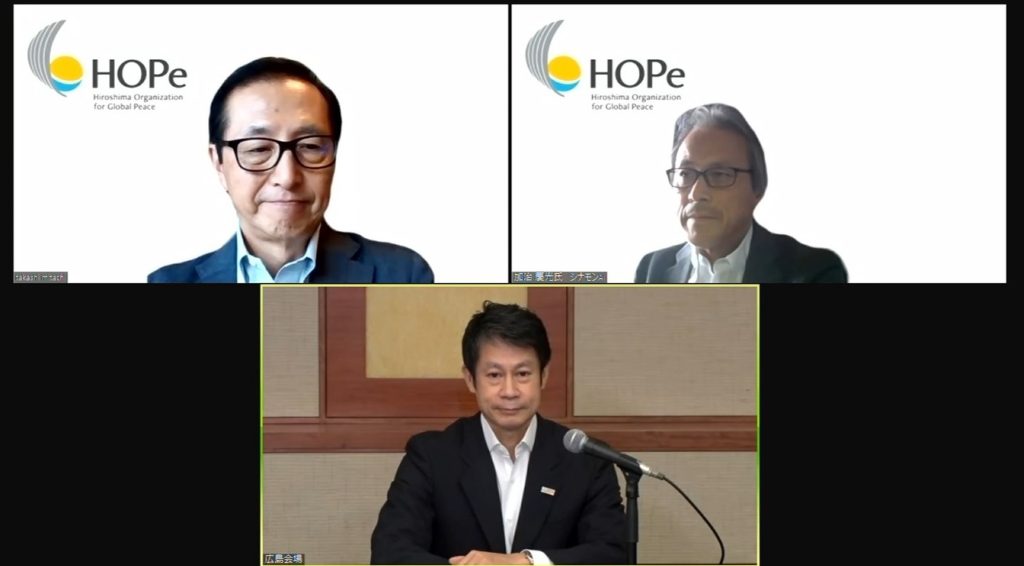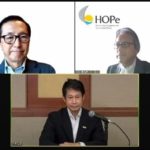Report on the 2021 Hiroshima Business Forum for Global Peace
The following is a summary of the discussions at the “2021 Hiroshima Business Forum for Global Peace” held on Wednesday, September 8 and Thursday, September 9, 2021.
Keynote Lecture
Speaker: FUNABASHI Yoichi (Chairman, Asia Pacific Initiative)

○ Peace and the economy form a mutually complementary relationship. A virtuous circle of this kind is not functioning now. The economy will be like a weapon if globalization becomes extreme, and it may cause a decoupling of peace and the economy that will be damaging to peace.
○ What is necessary in modern times is a national security partnership in which people address not only military but also nonmilitary threats (climate change, pandemics, terrorism, cyber security issues, etc.) as their own issues.
○ Businesspersons should take the initiative in working out emergency plans while also taking risks. They should speak up against populism and nationalism.
Session 1 What businesses can do to combat climate change: Energy conversion and innovative solutions toward creating a decarbonized society
Moderator
MITACHI Takashi (Senior Advisor, The Boston Consulting Group)
Panelist
KIDA Kazuya (President and Representative Director, Osaki CoolGen Corporation)
TAKEUCHI Sumiko (Senior Fellow and Member of Board of Directors, International Environment and Economy Institute(IEEI) / Co-founder and President, U3Innovations LLC. / Specially Appointed Professor, Tohoku University)
HYODO Masayuki (Representative Director, President and Chief Executive Officer, Sumitomo Corporation)
MIZUNO Hiromichi (Special Envoy of U.N. Secretary-General on Innovative Finance and Sustainable Investments)

○ The degree of implementation of climate-action measures, one of the 17 SDGs, affects the attainment of other SDGs. Given the importance of the role of the private sector in addressing climate-change issues, it needs to step up and fund provisions and investments.
○ Energy is fundamental to all kinds of economic activities. A carbon-free society thus cannot be achieved unless energy plans are combined with efforts to design investment schemes, improve overall social infrastructure efficiency and build an energy-conserving society. Under these circumstances, the central government and the private sector must join hands in building a viable business model.
○ The biggest challenge is having a vision toward the goal during the transition period. Showing vision is an important role to be played by businesses. Our society depends on business behaviors.
Session 2 Ensuring equitable access to essential medical supplies anytime, anywhere, for anyone in the world
Moderator
KASHIWAKURA Mihoko (Head of East Asia Relations, Bill & Melinda Gates Foundation)
Panelist
KUROKAWA Kiyoshi (Professor Emeritus, the University of Tokyo and National Graduate Institute for Policy Studies / Distinguished Professor of Tokai University)
TAKEMI Keizo (Member of the House of Councillors / WHO Goodwill Ambassador for Universal Health Coverage(UHC))
NAKATANI Hiroki (Visiting Professor, Keio University School of Medicine / Chair and Representative-Director, GHIT Fund)
YANAGAWA Noriyuki (Professor, Graduate School of Economics, University of Tokyo)

○ Health risks can affect national security because they may lead to economic crises which eventually hurt a state’s independence and autonomy. The concept of flexible resilience is necessary for a country to deal with future crises.
○ Japan must work out globally oriented policy measures if it is to achieve global health. It is necessary to develop human resources who can play a role in the global community and form internationally-oriented communities.
○ How should the economy and industries respond to significant changes in values? It is necessary to formulate policies that would produce desirable results from a medium- and long-term global perspective.
Session 3 Business against the background of the U.S.-China Standoff—How to cope with the geopolitical risk
Moderator
MURATA Koji (Professor of political Science, Doshsisha University)
Panelist
KAWAGUCHI Yoriko (Visiting Professor, Musashino University)
TAKASHIMA Makoto (President and CEO, Sumitomo Mitsui Banking Corporation)
MIURA Lully (President, Yamaneko Research Institute, Inc.)

○ There is no future for companies seeking only profit. Priorities must be grasped, analyzed and defined in detail.
○ What is necessary is not a simple translation but a “communication-oriented translation” which adds interpretation. Japan can play a role in that area. It is not necessary to compromise where compromise is impossible. But it is necessary to compromise where compromise is possible.
○ Even if values are different, it is possible to share interests. Japan should think about its national interests from a medium- to long-term perspective. Discussions on the matter are necessary.
Session 4 Correcting the overheated laissez-faire doctrine: What businesses can do to narrow the gap between the rich and the poor to maintain economic and democratic stability
Moderator
IDE Eisaku (Professor, Keio University Faculty of Economics)
Panelist
OTSUKI Nana (Expert Director, Chief Analyst, Monex, Inc.)
SHIBUSAWA Ken (CEO, Shibusawa and Company, Inc. / Chairman, Commons Asset Management, Inc.)
SUMI Shuzo (Senior Executive Advisor of Tokio Marine & Nichido Fire Insurance CO., Ltd.)

○ The central government has a significant role to play to build a society in which people can change their jobs to those in new industries without worry. It is necessary to build a society in which recurrent education is assured for people seeking to study after entering the job market. It is also necessary to build a society in which employment fluidity and social safety nets are ensured.
○ An increase in the number of freelance workers can become an economic prime mover. It is ideal to build a society in which companies are motivated to promote “reskilling” (re-development and re-education of employees for the attainment of vocational skills) and for them to see the development of human resources, which are regarded as social assets, as benefiting their own interests.
○ While complete fairness has yet to be achieved, a sound society is one in which people can develop their talents regardless of their family backgrounds. It is not too much to say that equality of opportunities and not resultant equality should be ensured.
○ A sound society is one in which work force fluidity and generational changes are active while old things are constantly replaced with new things. It is necessary to review Japan’s labor system to promote the replacement of old things with new things.
Session 5 How we should handle dual-use technologies when the boundary between peacetime and wartime is blurred
Moderator
JINBO Ken (Professor, Keio University)
Panelist
SAKAMOTO Yukio (SVP of UniGroup / Former President and CEO of Elpida)
HIRANO Miku (CEO, Cinnamon AI)
MURAI Jun (Distinguished Professor, Keio University)

○ Some restrictions are necessary on the use of personal information although such steps should not be a drag on innovation. There are things the Digital Agency can do about this.
○ Restrictive rules must be minimized because technological development may be hampered.
○ It is necessary for Japan to establish a system in which experts with a variety of backgrounds can gather as a team and discuss economic and national-security impacts, for example, for decision-making.
○ What is important is how dual-use technologies (military use and civilian use) are seen by their users. An ideal society is one in which suppliers are chosen for reasons other than economic rationality.
Session 6 What businesspersons can do to promote diversity & inclusion in the post-COVID-19 world
Moderator
SUEMATSU Minako (Chairperson, Publisher and President, The Japan Times, Ltd.)
Panelist
OBINATA Kuniko (Director, Diversity & Inclusion Center, DENTSU PUBLIC RELATIONS INC.)
KARASAWA Yasuyoshi (Chairman & Director, Chairman Executive Officer, MS&AD Insurance Group Holdings, Inc. )
SUGIYAMA Fumino (Co-chair of Non-Profit Organization TOKYO RAINBOW PRIDE / Executive Board member of the Japanese Olympic Committee(JOC))

○ Shifting to multistakeholder-based capitalism is necessary to ensure sustainability in future generations. Productivity must also be increased through diversity-led process innovation.
○ In view of the ongoing trend of diversity, companies will face a labor outflow unless they review the concept of “ordinary.” The business, social and sports communities must fulfill their responsibility of establishing a system in which disabled people can use their abilities to contribute to society.
○ For all people to live comfortably, fairness is more important than equality. If there is no fairness, disparity-induced divisions between people cannot be eradicated. Many approaches must be employed for all people to live comfortably.
Session 7 Integration between business administration and peace by way of commons
Moderator
YOSHIKAWA Narumi (Professor, Prefectural University of Hiroshima)
Panelist
EDO Cats (Head of Department/Professor, Prefectural University of Hiroshima)
Ho Chi DZUNG (Head of Research and Development, PeopleOne Joint Stock Company)
Marc HUMBERT (Emeritus professor of political economy, Rennes University / Co-founder of PEKEA, to build a Political and Ethical Knowledge on Economic Activities / Co-founder of the International Convivialist)
YOKOYAMA Yoshinori (Dean, Prefectural University of Hiroshima)

○ It is necessary to consider designing a social system in which the abstract idea of peace is managed as a real market through the utilization of finance and capital. It is time to shift from “ideas” to “practice” while using the commons (various shared resources and public goods).
○ Companies can develop themselves by providing jobs. They can avoid conflict with stakeholders by creating jobs for workers that keep their lives at a high level, protecting the environment and meeting their legal requirements.
○ It is necessary to address poverty, labor, and environmental and peace issues from the perspective of advancing social marketing as part of the efforts to fulfill social responsibilities.
Concluding Panel Discussion Reflecting on this fiscal year’s forum (release of the 2021 Hiroshima Appeal)
Panelist
KAJI Yoshimitsu ( Chairman and Chief Sustainable Development Officer, Cinnamon AI / Senior Principal, Hitachi Lumada Innovation Hub / Smart City Advisor, Kamakura City Government)
MITACHI Takashi (Senior Advisor, The Boston Consulting Group)
YUZAKI Hidehiko (Governor, Hiroshima Prefecture)

○ The 2021 Hiroshima Appeal wrapped up discussions of this year’s forum and updated the 2020 Hiroshima Declaration issued last year.
○ Ensuring peace, which is regarded as security for people in a broad sense, is a prerequisite for companies undertaking business activities. Peace is something that should be protected and strengthened by businessmen. Work should be conducted to advance peace. Some of the work has produced the results intended in the SDGs.
○ How to realize the proposals in the 2021 Hiroshima Appeal is a question to be addressed. There should be more work to ensure peace, achieve economic advancement and produce fruitful results.
○ Utilitarianism is where an individual should seek his or her best interests by pursing the interests of other people. This is true utilitarianism, and businesses should work out long-term policies from this perspective.
Hiroshima Appeal
https://hiroshimaforpeace.com/en/hiroshimabusinessforumforglobalpeace2021/2021hiroshimaappeal
Tags associated with this article







